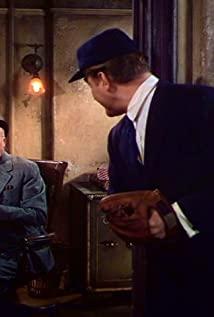Speaking of long shots, I forgot who said that “the use of long shots does not leak traces and makes people unable to perceive their existence. This is the brightest way to use them”, but this should only be aimed at realist film lovers. It is estimated that I agree very much. As for formalist films, the presence of an excellent lens is no less than the change of narrative angle in the novel, and what it creates is a more direct expression of emotion or desire to express. The long shots of "Lady in the Fall" can be said to be perfectly used. For realism, the long shots directly explain the cause of the event, and at the same time arrange the protagonist's debut, which can be said to save time and effort; for formalism, long shots The time bomb at the beginning of the scene grabs the viewer's heart all the time, and while pushing the plot, it also renders the uneasy atmosphere.
Wells's skills really make people conjure up, and his choice of story topics is also excellent. The film tells the conflict between law enforcement procedures and law enforcement results, and this is indeed an eternal theme that is unclear. As far as the rule of law is concerned, because the system restricts power, even if the system is imperfect, the authority of the system must be resolutely maintained. Under such circumstances, the 1994 Simpson Wife Killing Case in the United States could result in an unconvicted crime because the procedure for collecting evidence was illegal, and Inspector Quinlan in "Gone With the Robber" could also be degraded because of the illegal procedure for the perpetration. crime. Of course, this should be the case for countries under the rule of law, especially in democratic countries with separation of powers. Even if they never have a fully complete system, they can only wait for the gradual revision of the system, and it is absolutely impossible to confront the system, the amendment of the United States. The case history is a typical example, in which the requirements for rational recuperation of people are quite high.
But in contrast, the resultist does not care whether the procedure is legal, and the result is everything. Therefore, in their eyes, as long as it is a crime, it should be sanctioned, and the procedure is only a tool, not a purpose. The result should not be denied because the procedure is illegal, but the procedure should be used to serve the result. It can be said that this kind of thinking is very widespread in the Mainland, especially since China has thousands of years of history of the rule of man, and there are countless cases of severe torture in order to make suspects confess guilt. Of course this is a historical factor, and the value of current society is even more exaggerated. Because the central government regards the “no matter white cat or black cat, catching a mouse is a good cat” as its social value, the resultantism is intended to encourage wealth, but in the long run, the resultant resultantism ultimately leads to procedural unscrupulous means. Gradually spread to other areas. Take the "human flesh search" on the Internet. It is actually an infringement of personal privacy. The procedure is illegal. However, due to the spread of result theory and the imperfect rule of law, netizens call for human flesh search and the world responds. Phenomenon. Therefore, if Simpson’s wife murder case was placed in the mainland, he might be sentenced on the same day, and Inspector Quinlan might be a legalized hero in the mainland.
However, the two situations seem to be opposed, but the boundary lies in the difference of individual thoughts. If you don’t talk about extreme outcomeists, just take a rational rule of law. They can easily become outcomeists when they lose their minds. For example, in the Japanese anime "Death Note", as the first protagonist, Yagamiyue has been the audience's narrative role since the first episode, and when he carried out mass murders in the name of justice, I believe most audiences They are all concerned about how things develop, or whether Ye Shenyue has been arrested, and so on, rather than whether the killing is illegal and whether it brings some kind of illegal panic. Of course, this is related to the fictional plot, but it is undeniable that most viewers will be envious of Ye Shenyue's ability to have a death note. And the difference between people, or the difference between rational and irrational lies only in whether you will do it. If you really own a death note, the possibility of using it is absolutely there.
Therefore, the degree of importance of procedures and results is judged relative to people's subjective thoughts, but people's subjectiveness is too empty, then objective things become unpredictable and interesting, and even bring some unknown fear. The outcomeist Quinlan of "Beautiful Lady", even if he has a sixth sense beyond ordinary people and solves countless cases, he can't avoid the illegal behavior of blaming the innocent because of long-term illegal procedures. If it is said that breaking the law in order to solve the case can be argued by the result-only theory, then those who blame the innocent will completely lose the moral commanding heights, so Quinlan's death has become inevitable. In contrast, as a rationalist Mexican official Vargos has always insisted on institutional justice, and in front of Inspector Quinlan, he is even more disadvantaged, embarrassed, pedantic and incompetent. If it were not for the defection of cronies, then institutional justice may have died. But after all, it's just a movie. Inspector Quinlan's death in the dirty river water may be the best freehand ending. The creation of the sad situation caused the audience to pity a little bit. Perhaps this is also Wells's inner heart for illegal justice. Subjectively shaken.
View more about Touch of Evil reviews











